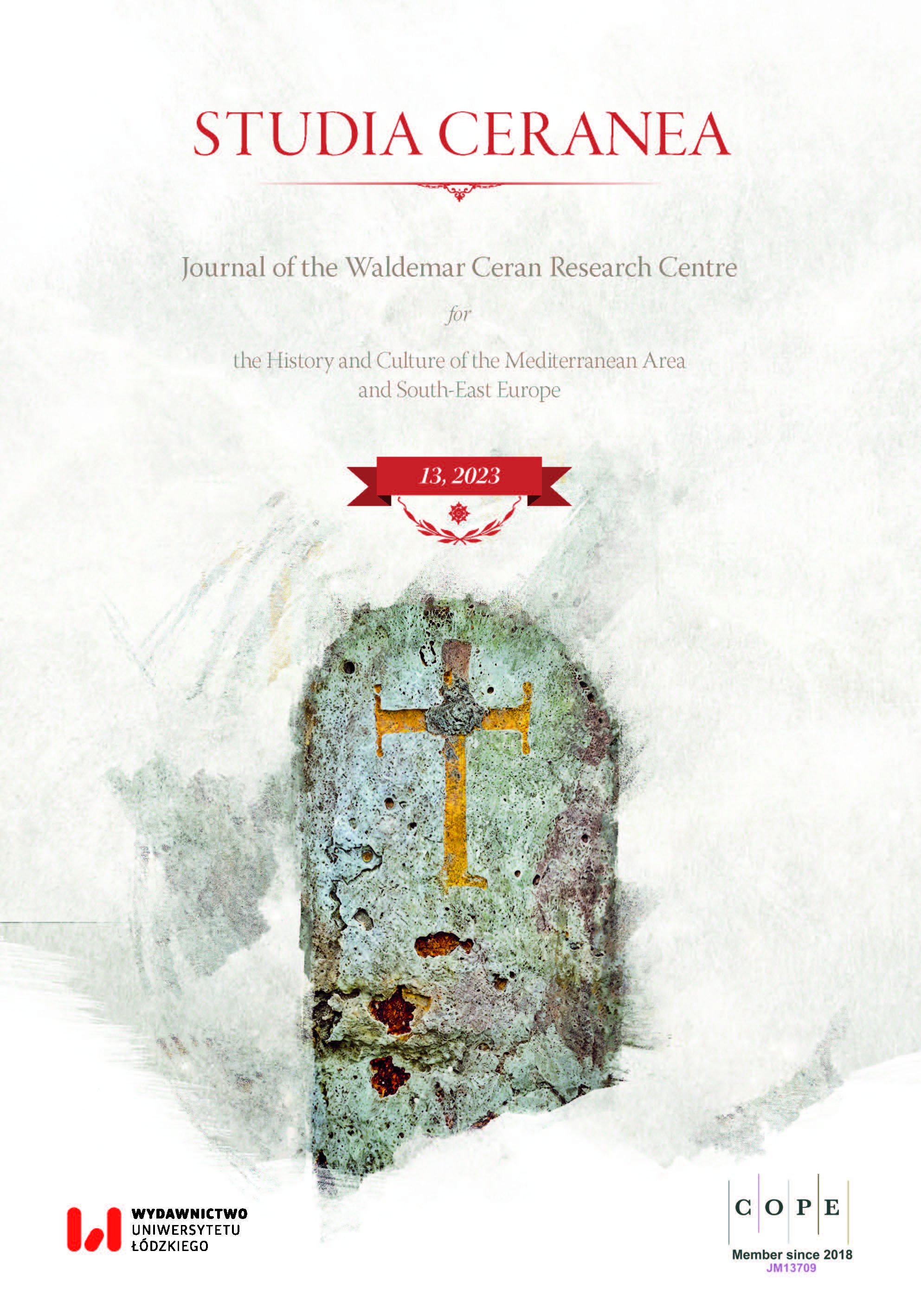Bankers and Usurers in the Early Byzantine Hagiographical Texts
DOI:
https://doi.org/10.18778/2084-140X.13.26Słowa kluczowe:
early Byzantium, early Byzantine hagiography, money, bankers and usurers in early ByzantiumAbstrakt
The text discusses accounts from early Byzantine hagiographical texts depicting the activities of bankers and usurers in the period from the early 5th to the second decade of the 7th century. Texts by Palladius of Helenopolis, John of Ephesus, John Moschos, and Leontius of Neapolis are analysed. In the collated material we find relatively little information depicting the activities of bankers and usurers. Neither do we find any further details of the conditions under which money loans were granted. However, we note the statement that the cancellation of a loan, even if forced by circumstances (even if due to the intervention of a holy man), is charitable in nature and the ‘lost’ capital by the creditor in such a case bears the characteristics of a merciful deed. Most of the analysed accounts are presented in a somewhat fanciful way, which, however, should not question the information conveyed by the narrative. Two aspects of the analysed accounts are most significant. Firstly, the absence of any criticism of the Alexandrian Church deriving, even if not high, some profits (interest) from monetary loans. Secondly, in the accounts analysed we note a peculiar narrative, or in fact a new way of reasoning, by means of which the authors wanted to reach their audience, the potential benefactors. Thus, we become acquainted with somewhat naïve tales of how the benefits of granting a non-refundable loan to the needy, not only to the poor but also to merchants who traded on the high seas (?) would quite quickly return to the merciful benefactor, in a tangible material benefit, while he was still alive. We do not find such an argument in the patristic texts of the 4th and 5th centuries, where accounts of this kind merely refer to a prediction or even a guarantee of ‘heavenly interest’ that could tip the scales in favour of the merciful donor (creditor) at the Last Judgement.
Pobrania
Bibliografia
Joannes Ephesinus, Historia beatorum orientalium. Lives of Eastrn Saints, ed. E. W. Brooks, [in:] Patrologia Orientalis, 17.1, Paris 1923.
Google Scholar
Joannes Moschos, Pratum spirituale, [in:] Patrologiae cursus completus, Series graeca, vol. LXXXVII.3, ed. J.-P. Migne, Paris 1865, col. 2852–3112.
Google Scholar
John Moschos, The Spiritual Meadow, ed. et trans. J. Wortley, Kalamazoo 1992.
Google Scholar
Leontius Neapoleos, Vita Joannis Eleemosynarii, [in:] Leontios von Neapolis Leben des hl. Johannes des Barmherzigen, ed. H. Gelzer, Freiburg im Breisgau 1893.
Google Scholar
Leontius of Neapolis, Life of John the Almsgiver, [in:] E. Dawes, N. H. Baynes, Three Byzantine Saints. Contemporary Biographies Translated from Greek, Oxford 1948, p. 207–270.
Google Scholar
Palladius, The Lausiac History, vol. II, ed. et trans. C. Butler, Cambridge 1904.
Google Scholar
Adelson H. L., A Note on the Miliarense from Constantine to Heraclius, “American Numismatic Society. Museum Notes” 7, 1957, p. 125–137.
Google Scholar
Arbandt S., Macheiner W., Gefangenschaft, [in:] Reallexikon für Antike und Christentum, vol. IX, ed. T. Klauser, Stuttgart 1976, col. 318–345.
Google Scholar
Bogaert R., Changeurs et banquiers chez les pères de Église, “Ancient Society” 4, 1973, p. 239–270.
Google Scholar
Bogaert R., Geld (Geldwirtschaft), [in:] Reallexikon für Antike und Christentum, vol. IX, ed. T. Klauser, Stuttgart 1976, col. 797–908.
Google Scholar
Chadwick H., John Moschus and his Friend Sophronius the Sophist, “The Journal of Theological Studies” 25, 1974, p. 41–74, https://doi.org/10.1093/jts/XXV.1.41
Google Scholar
DOI: https://doi.org/10.1093/jts/XXV.1.41
Constantelos D. S., Byzantine Philanthropy and Social Welfare, New Brunswick–New Jersey 1968.
Google Scholar
Drexhage H.-J., Handel I (geschichtlich), [in:] Reallexikon für Antike und Christentum, vol. XV, ed. T. Klauser, Stuttgart 1992, col. 519–561.
Google Scholar
Hahn I., Theodoretus von Cyrus und die frühbyzantinische Besteuerung, “Acta Antiqua Academiae Scientiarum Hungaricae” 10, 1962, p. 124–131.
Google Scholar
Harvey S. A., Asceticism and Society in Crisis. John of Ephesus and the Lives of the Eastern Saints, Berkeley 1990 [= Transformation of the Classical Heritage, 17].
Google Scholar
Hollerich M. J., The Alexandrian Bishops and the Grain Trade: Ecclesiastical Commerce in Late Roman Egypt, “Journal of the Economic and Social History of the Orient” 25, 1982, p. 187–207, https://doi.org/10.2307/3632110
Google Scholar
DOI: https://doi.org/10.1163/156852082X00120
Hübner A., Einführung, [in:] Palladius, Historia Lausiaca. Geschichte aus dem frühen Mönchtum, trans. et comm. A. Hübner, Freiburg–Basel–Wien 2016 [= Fontes Christiani, 67], p. 7–77.
Google Scholar
Hunt E. D., Palladius of Helenopolis. A Party and its Supporters in the Church of the Late Fourth Century, “The Journal of Theological Studies” 24, 1973, p. 456–480, https://doi.org/10.1093/jts/XXIV.2.456
Google Scholar
DOI: https://doi.org/10.1093/jts/XXIV.2.456
Ihssen B. L., John Moschos’ Spiritual Meadow. Authority and Autonomy at the End of the Antique World, Washington 2013.
Google Scholar
Johnson A.Ch., West L. C., Byzantine Egypt. Economic Studies, Amsterdam 1967.
Google Scholar
Jundziłł J., Pieniądz w łacińskiej literaturze chrześcijańskiej późnego Cesarstwa rzymskiego, Warszawa 1984.
Google Scholar
Milewski I., Bankers, Usurer and Merchants. Businessmen of the Late Antiquity Cities in Reports of Greek Church Fathers of the Fourth Century, “Münstersche Beiträge zur Antiken Handelsgeschichte” 20, 2001, p. 96–113.
Google Scholar
Milewski I., Pieniądz w greckiej literaturze patrystycznej IV wieku (na przykładzie pisma kapadockich Ojców Kościoła i Jana Chryzostoma), Gdańsk 1999.
Google Scholar
Milewski I., Textile Prices in Early Byzantine Hagiographic Texts. Three Case Studies, “Studia Ceranea” 10, 2020, p. 399–413, https://doi.org/10.18778/2084-140X.10.19
Google Scholar
DOI: https://doi.org/10.18778/2084-140X.10.19
Monks G. R., The Church of Alexandria and the City’s Economic Life in the Sixth Century, “Speculum” 28, 1953, p. 349– 362, https://doi.org/10.2307/2849693
Google Scholar
DOI: https://doi.org/10.2307/2849693
Rauf J., Depositum, [in:] Reallexikon für Antike und Christentum, vol. III, ed. T. Klauser, Stuttgart 1957, col. 778–784.
Google Scholar
Zeisel W. N., An Economic Survey of the Early Byzantine Church, New Brunswick–New Jersey 1975.
Google Scholar
Pobrania
Opublikowane
Jak cytować
Numer
Dział
Licencja

Utwór dostępny jest na licencji Creative Commons Uznanie autorstwa – Użycie niekomercyjne – Bez utworów zależnych 4.0 Międzynarodowe.














